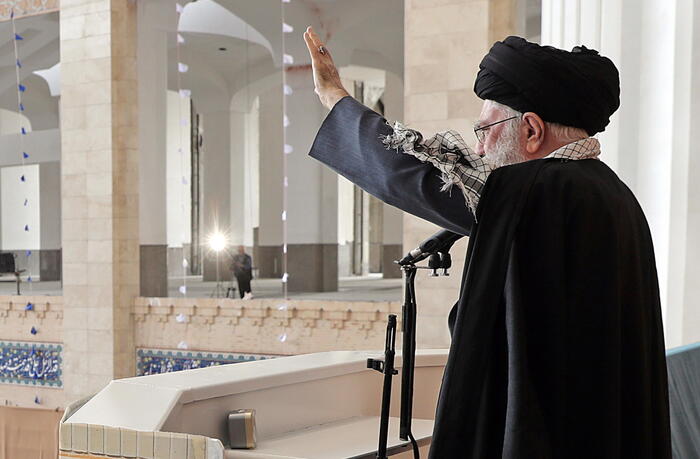Hungary is using deterrence in refugee policy. Asylum seekers are accommodated in container camps without freedom of movement, asylum applications are not examined. Now the highest EU court intervenes.
Luxembourg (dpa) - Basic parts of the Hungarian asylum policy violate EU law after a judgment of the European Court of Justice.
This applies, among other things, to the accommodation of rejected asylum seekers in the Röszke container warehouse secured with barbed wire. The judges ruled that the conditions in the zone on the Serbian border should be classified as detention. For this, however, each individual case must be examined (C-924/19 PPU and C-925/19 PPU).
The verdict is a serious defeat for the right-wing Prime Minister Viktor Orban. However, there was initially no reaction from the Hungarian government to the judgment. Budapest has had a policy of foreclosure and deterrence for years. The EU Commission has already initiated several criminal proceedings against the country. On Thursday, the authority also warned that the restrictions on fundamental rights introduced in the Corona crisis must now be withdrawn, especially in Hungary.
In the specific case, four asylum seekers from Iran and Afghanistan came to Hungary via Turkey, Bulgaria and Serbia. The Hungarian authorities rejected their asylum applications on the grounds that people had entered a country - the non-EU state of Serbia - in which they faced neither persecution nor serious harm. In addition, there is an adequate level of protection in the countries through which they came. The competent court dismissed claims against this decision without examination.
However, Serbia refused to take the people back, whereupon Hungary specified their home countries as targets for the repatriations. An area in the Röszke transit zone was also assigned to those affected. According to the ECJ, they are in an area for rejected asylum seekers.
Hungary set up two of these camps in spring 2017 and is holding (rejected) asylum seekers there. The areas are surrounded by high fences and barbed wire. Hungary argues that the people stayed there "voluntarily" because the way to Serbia was open to them. The Helsinki Committee for Human Rights in Hungary had repeatedly accused the authorities of withholding food from migrants in the camps.
The judges now decided that the conditions in the Röszke camp were equivalent to deprivation of liberty - above all because the persons concerned could not legally leave the camp in any direction. If they go to Serbia, they will lose any prospect of asylum. In addition, they would have to face sanctions on the Serbian side because the authorities there consider this to be illegal. In principle, each individual case had to be examined and an order issued to arrest asylum seekers. In the present case, that did not happen. The legality of detention must also be able to be judicially reviewed.
According to the ECJ, different rules apply to people entering a country and applying for international protection there. EU countries should force them to stay in a transit zone while the application or right of entry is being examined. Under no circumstances should detention last longer than four weeks.
The Luxembourg judges also identified other major shortcomings in the Hungarian asylum system. For example, the rule that an asylum application can be rejected if the applicant has entered via a "safe transit country" violates EU law. The decision to change the destination country of the repatriation without further ado was so important that the persons concerned had to be able to take legal action against it. However, they were only able to object to the asylum authority. However, this is subordinate to the minister responsible for the police and is therefore not independent.
The Hungarian Helsinki Committee welcomed the verdict on Thursday. "This judicial decision makes it clear that the provisions of Hungarian asylum law are incompatible with European law," wrote the Helsinki Committee co-chair, Marta Pardavi, in a statement. The human rights organization had brought the four victims - a couple from Afghanistan and a father with son from Iran - to the Luxembourg court. The verdict was not only a great success for the four, "but also for the other people who languish in the transit zones and for every law-abiding Hungarian citizen."
Since the refugee crisis in 2015, Chancellor Angela Merkel and Orban have been two of the greatest opponents in European asylum policy. Merkel helped Orban in September 2015 by not closing the German borders for refugees coming from Hungary. However, it has never forgiven Hungary for strictly refusing to participate in the distribution of refugees, which has been decided by the majority of the EU countries.
At the same time, the chancellor, known as pragmatic, has never had official contacts with Orban broken off. There may be several reasons for this: Merkel knows that she will also need Orban if the German EU Presidency starts in July and is about the multi-year EU budget or reforms in the international community. In addition, she fears that excessive demarcation could drive Orban even more into the arms of Russia or China. Most recently, she publicly praised Orban in mid-February when he visited Berlin for economic development in Hungary.
ECJ documents on the case
Eurostat on asylum applications 2019
Statement by the Helsinki Committee, Engl.













